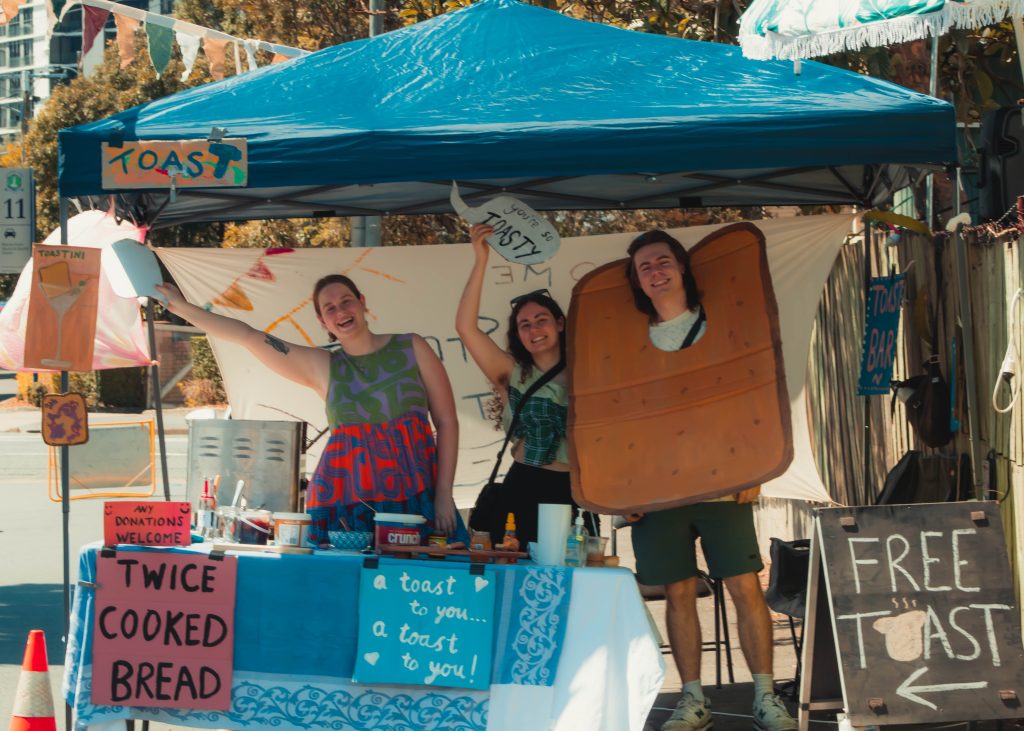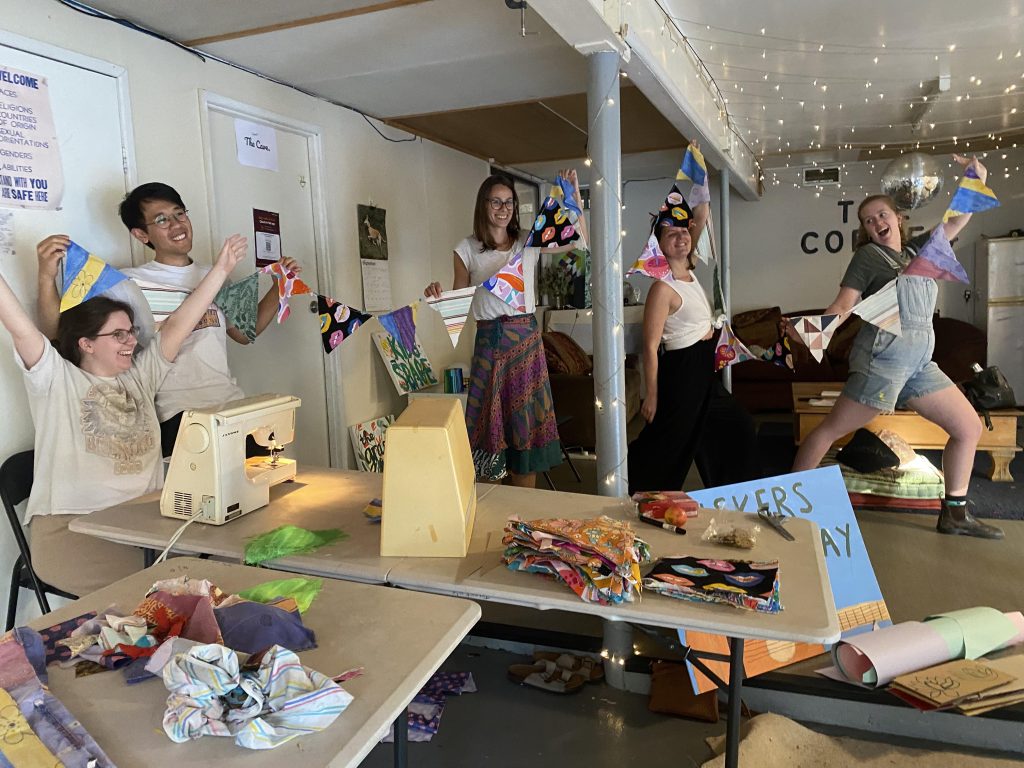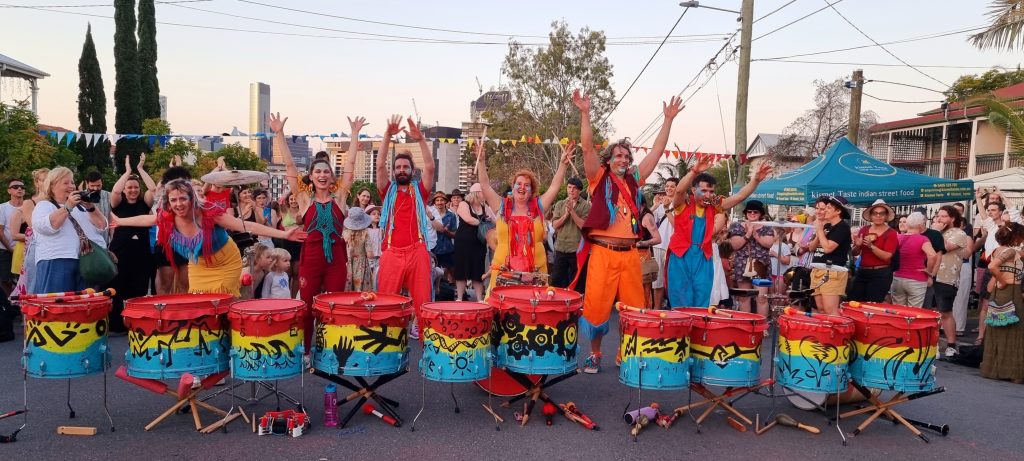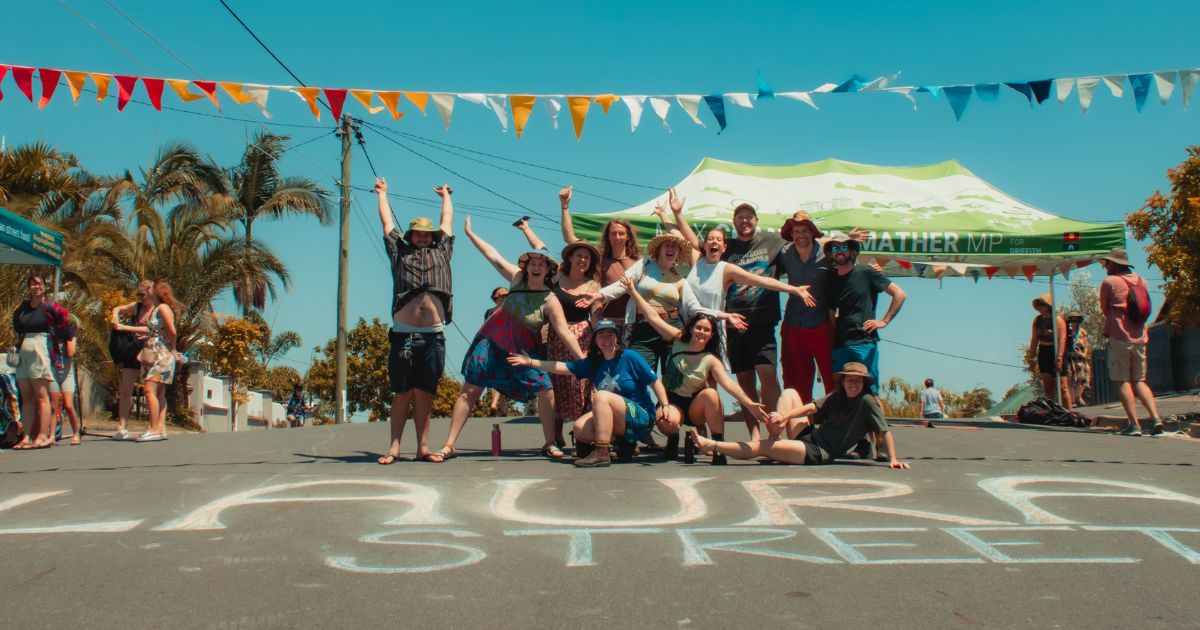So, what does it take to run a community festival? Really? Jess Wallis from Laura Street Festival explains.
I’ve been to many festivals, run and sponsored by councils and corporations, and none have felt as magical as the ones built from community.
When I was a kid, my family moved into a set of five town-houses, and that first Christmas we were invited to a driveway party, people pulled out their fold-out tables and everyone took their dining chairs and we ate, laughed, and played. That space designated for 30 seconds of use to pull your car into your garage on the way home from work, became a space for us to connect. We got scooters for Christmas and the other neighbour kids got roller skates, bikes, and balls, and we raced and bounced, and burnt our feet on the scooter brakes all along the driveway. We waved hi to our neighbours as they arrived home and my first job was babysitting the baby across our house, and my second was tutoring the child one down from her.
It’s only recently these memories came flooding back. In September at the Kurilpa Derby, seeing the kids take over the road for races, to race again, and again and again and again – aren’t they tired yet?! In October at Laura Street Festival we put out buckets of chalk around the street, and within an hour the stark grey bitumen was a colourful beautiful sign of creativity. I watched in curiosity as a kid drew the 6th circle around a circle and saw him write F..O..R..C…FORCEFIELD! It was everything I hoped for when I put my hand up to organize Laura Street Festival.
When I put my hand up to organise Laura Street Festival I really wanted to know, how hard is it? What does it take?
And before we get into the nitty-gritty, from being a part of something so big, I can confidently pull it down to its core, to create a bare minimum guide for you. A place to start, and then see how it grows. Because Laura Street Festival is whatever the people wanted it to be, and your event will be what the people want it to be!
It starts with you – a keen neighbour with a loose idea and interest in connection. You, knocking on all your neighbours’ doors, and putting your contact details in their letterbox if they’re not home. Chatting to everyone interested and finessing an idea and date/time together. This is where we found out, this festival was going to be big!!

You then move on to assigning tasks and sourcing resources:
- Resources – the bare minimum: a couple of picnic rugs, a table and a couple of chairs + chalk is always excellent.
- Tasks – the bare minimum: food/drinks organizer (you can also do bring a plate), activity organiser (music? a board or sports game?).
Next head off to drop the official invite to those who might not have had time to get involved, maybe promoting it in the community or printing a few posters. Finally, when it’s time to host, you can gather on someone’s front yard, driveway, or look for creative solutions to party on the street.
Extras
As we know Laura Street Festival then added ~a few~ more steps, getting official street closure, getting interest from local artists/performers/ workshop facilitators/ speakers, hosting the party not just on the street but in eight neighbours’ houses, getting festival volunteers from the community, not to mention running for nine hours. Don’t let this overwhelm you though because Laura Street Festival has six years of legacy, insights and knowledge we were able to build upon in 2023 (more about the legacy and history here).

Does this kind of thing cost much? What are the costs?
Laura Street Festival costs very little to run, because of the volunteer and community power behind it. It relies very much on everyone choosing to give what they can, whether that’s their talent, their resources or their time – especially their energy!
Thriftiness and creativity is what helps reduce costs, we are zero-waste so don’t require expensive bin hire and waste management, we don’t do paid tickets so don’t require expensive security fencing and we put the artists at the top of a hill so we don’t need a stage. We don’t want anyone to profit from the community and we aim to build capacity and resourcefulness, always asking – do we have any other options to get this for free, borrow/ loan it or change our plan a little? Things left over to pay for were covered directly by the Gabba Ward council office, and for incidentals, we were thrilled to get a last-minute grant from Meanjin Solidarity Fund which was very helpful to fund some of the consumables on the day.
| PEOPLE POWER | |
| 5 Organisers (weekly meetings for 5 months) | Donated their time |
| Neighbours (3 entirely self-managed venues) | Donated their time |
| Volunteers on the day (3 hour shifts) | Donated their time |
| First aid volunteers | Donated their time |
| Artists/ musicians/ workshop hosts | Donated their time |
| Welcome to Country | Funded directly by council grant |
| RESOURCES | |
| Ute | Loaned from council for equipment collection and drop-off |
| Venues (neighbours houses and the street) & their electricity/ water | Loaned |
| Marquees, sound systems, tables, chairs, lighting, projector | Loaned – council, community members and community organisations |
| Public Liability Insurance *mostly to cover the large numbers of people on the street as we found houses concerned about this were covered under their own insurance | Auspiced under local community organisation – West End Community Association (no cost) |
| Decorations | Loaned & created by volunteers |
| Craft supplies | Donated |
| Volunteer Food | Donated by café on the street (Dovetail) & Ananda Marga Mediation Centre on the street |
| Free food options | Donated by the food providers – neighbours and community organisations |
| Printing | Donated by organisers, community members and council/state offices |
| Toilets | 1 Loaned from a neighbour & 3 portaloos funded directly by council grant |
| Road closure application fee | Funded directly by council grant |
| Incidentials: 15 high vis vests for volunteers, small number of paper cups/ plates (as backup), toilet paper, kids craft supplies/ chalk, sunscreen | Received $150 grant from Meanjin Solidarity Fund |
So, if you, like me, have been curious about what it takes to start a community festival, don’t hesitate to start taking steps or reach out for support. Never underestimate your power to make a difference. A simple street party can have a profound ripple effect of breaking down social barriers and reclaiming our streets and driveways as spaces of connection.



